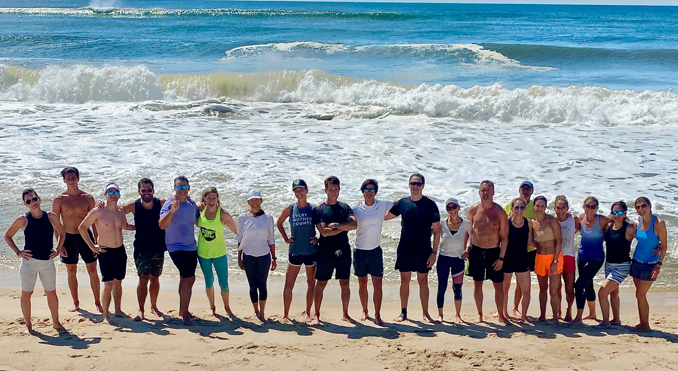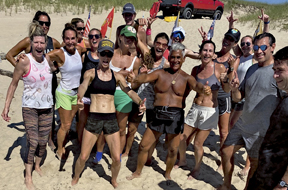
Montauk – A Blue Zone?
Can Montauk be a Blue Zone?
Kale smoothies, collagen boosters, under eye serum. Secrets to longevity lie not in our band aids but in attention paid to the foundation of wellness. Lately we have been hearing more about these legendary ‘Blue Zones,’ five specific regions of the world that are known for long life expectancy and a better overall quality of health. While we are not in Japan, Costa Rica, California, Greece or Italy, Montauk has much in common with the attributes that determine a Blue Zone and what bolsters a healthy lifestyle.
Author Dan Buettner used the term and called his book The Blue Zones, when studying areas on the planet that are host to the longest-living people with lower rates of disease and obesity. The common practices found in The Blue Zone regions are enjoying a Mediterranean diet (Icaria, Greece), physical movement and red wine (Sardinia, Italy), eating soy-based foods (Okinawa, Japan), a plant-based diet and sense of purpose (Nicoya Peninsula, Costa Rica), and fostering tight-knit communities that are also vegetarians (Loma Linda, California).
 While genetics play a role, up to seventy percent of longevity is determined by our lifestyle, diet, health habits and community. Eating a plant-based diet was the most common thread in all the Blue Zones, eating meat and seafood only a handful of times a month. While fresh caught fish is abundant on the east end and an excellent source of necessary omega-3 fats, our access to farm stands, organic produce, fresh herbs, and local vegetables promote a diet rich in vitamins, minerals, and fiber. Poor nutrition is correlated to risk of cancer, heart disease, high blood pressure and metabolic syndrome, so including vegetables, whole grains, nuts, and legumes are staples in following a Blue Zone diet.
While genetics play a role, up to seventy percent of longevity is determined by our lifestyle, diet, health habits and community. Eating a plant-based diet was the most common thread in all the Blue Zones, eating meat and seafood only a handful of times a month. While fresh caught fish is abundant on the east end and an excellent source of necessary omega-3 fats, our access to farm stands, organic produce, fresh herbs, and local vegetables promote a diet rich in vitamins, minerals, and fiber. Poor nutrition is correlated to risk of cancer, heart disease, high blood pressure and metabolic syndrome, so including vegetables, whole grains, nuts, and legumes are staples in following a Blue Zone diet.
Those in Blue Zone regions follow an ‘eighty-percent rule’ of eating until they are eighty-percent, not one-hundred percent full. Mindful eating, eating smaller meals later in the day and not eating excess calories are also practices conducive to living on the east end with more awareness on quality and not quantity. Montauk and The Blue Zones share an approach to alcohol consumption, particularly red wine from Grenache grapes that hold high levels of antioxidants. While protecting damage to DNA that leads to rapid ageing, antioxidants found in wine are a factor in longevity, when enjoyed in moderation.
Blessed with beautiful beaches, plentiful trails for hiking or biking, waves for surfing, paddling, and kayaking, oceans and bays for swimming, tennis, golf, horseback riding and even pickleball, Montauk has a landscape to encourage physical movement and exercise. While the Blue Zones have the advantage of built-in physicality to work outside, walk long distances out of necessity and have more mountainous regions, regular exercise lowers risk of death and prolongs a healthier life overall.
Researchers cannot say enough about sleep, the duration, quality, and time frame in which we allow our body to repair. While brief daytime napping is consistent in the Blue Zones, finding the average seven to eight hours of quality sleep in sync with the sun and seasons supports all functions of the body. Most important to Montauk’s parallel to the Blue Zones includes the importance of community, a social network, having close friends and family and social support. Not only does this assist in preventing higher rates of loneliness, isolation, and feelings of depression, having a strong sense of belonging and social ties will add years to your life, and promote a healthier lifestyle for the future.

